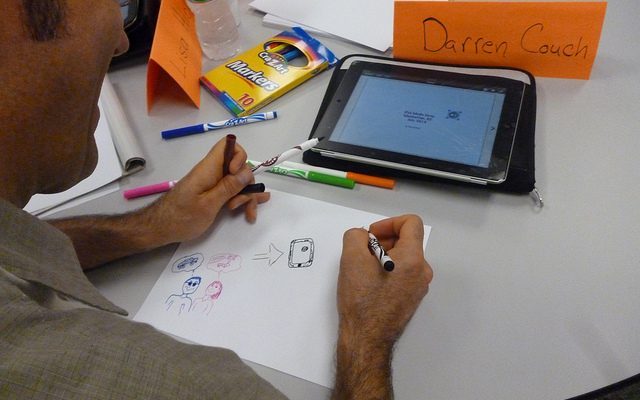An OER Common Core Curriculum
A former teacher and instructional coach details how she and her team helped the state of New York develop an ELA curriculum from the standards up.
Guest Post by Rebecca Stanko, Ed.D.
To support educators in implementing the Common Core State Standards, the New York State Education Department (NYSED) allocated Race to the Top funds to develop a new, standards-based, open-source K-12 English and math curriculum. The results of these efforts are now housed on EngageNY, an online portal where educators can go to find free, downloadable open educational resources (OERs), supporting professional development, and background on the standards and related instructional shifts.
When my writing team and I started working with New York to develop the EngageNY English language arts curriculum for grades 9-12, we started with the standards themselves—they are the backbone of the curriculum. We then considered each of the texts selected for the curriculum, asking, “How can we organically address the standards based on this text? Which standards seem inherent in the text?” Based on the focal standards and texts, we developed assessments and worked backward from there to design instruction and learning experiences.
As we worked, we saw that a lot of publishers identified their materials as “Common Core-aligned,” which typically meant that existing materials had been retrofitted to the standards. Our team, on the other hand, was developing curriculum from the standards up in a way that had not been done before. To clarify the distinction, we stopped calling our work for EngageNY a “Common Core-aligned curriculum” and started calling it simply “a Common Core curriculum.”
The EngageNY curriculum includes four modules per year. We completed the final module for 12th grade last summer. To other states or districts looking to undertake a similar curriculum development project, I would give the following advice:
- Apply principles of backward design. Avoid trying to shoehorn standards into existing materials. Start by becoming intimately familiar with the standards and supporting documents, such as the Publishers’ Criteria and Appendices. Understand how the standards are interrelated within and across grade levels. With the overarching goal of cultivating students’ independence—or readiness for college and career—develop standards-based assessments and use them to guide development of the curriculum.
- Look for opportunities for interdisciplinary learning where you can incorporate standards for history and social studies, or science and technical subjects. Because of the emphasis on nonfiction and informational text in the Common Core, there are lots of these opportunities, and I would encourage states, districts, and teachers to capitalize on those connections.
- Be mindful of how much time it takes to develop a coherent, high-quality curriculum. From understanding the standards, to developing standards-based assessments and rubrics, to selecting complex texts, to writing text-dependent questions and planning learning experiences, each phase of development requires extensive time for collaboration, thinking, writing, rethinking, and rewriting.
- Use the resources that are available to you. In addition to EngageNY, look to websites like Achieve and Student Achievement Partners that post exemplar Common Core units. Adapt them or use them as models for your own curriculum. These organizations have done the research and the thinking. Don’t reinvent the wheel, but do put your spin on it—as long as the spin still means implementing the standards and shifts with integrity.
All of these ideas are nice in theory, and when they are realized, they have great potential to positively impact what happens in the classroom. Here’s what’s happening in classrooms across New York and in other states using the EngageNY curriculum: Teachers are letting the students do the work. They are stepping back so that in a discussion, the students aren’t talking to the teacher, they’re talking to each other. When students are doing research, they’re following their own leads. Teachers are not teaching a text—they are teaching students the skills and content embedded in the standards via the text. They are giving students tools, not information. They are giving students time and space to think and to build their own knowledge and understandings.
As a former high school English teacher, I wanted the curriculum to give the standards life so that the teachers using them could incorporate the new standards into instruction with as little disruption as possible. A thoughtfully developed curriculum that models the instructional shifts allows teachers to focus on their students as they internalize new ways of teaching or refine aspects of their current practice. Our intention at PCG Education was to provide a resource for teachers that makes possible these ways of teaching and learning, and that’s really what the EngageNY curriculum is all about.
______
Rebecca Stanko, Ed.D., is a Field Associate and Subject Matter Expert in PCG Education’s Education Consulting division. Most recently, Dr. Stanko directed content development for PCG for the 9-12 English Language Arts (ELA) EngageNY Curriculum, an open educational resource based on the Common Core State Standards and developed in collaboration with the New York State Education Department and the Regents Research Fellows. She also supports PCG’s publishing partnership with Jossey-Bass/Wiley to bring the EngageNY curriculum to print.






